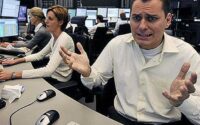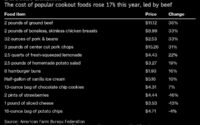Powell’s Honesty About Inflation Is Rare. Why Markets Need to Be Worried.
It’s highly unusual for the heads of four of the world’s most powerful central banks to hold a public discussion together. That’s what happened on Wednesday in Sintra, Portugal.
The headlines saying the Federal Reserve and others are likely to keep raising interest rates weren’t enough to cause shock waves—stocks finished more or less flat.
But the underlying messages were quite frightening. For one, Fed Chairman Jerome Powell and his peers more or less admitted they don’t understand what is happening right now in their battle with inflation.
They couched that message in positive spin—it’s great that economies have proven resilient since they started tightening, and it’s a nice surprise that unemployment remains so low. Translation: That’s not what we would have expected, and we’re not totally sure why the economy hasn’t tanked after the biggest and fastest rate hikes in a generation.
Same for the message that policy is data-dependent. Translation: We don’t have confidence in our own forecasts, we need more clues from what’s happening on the ground.
The slowdown in inflation so far can be attributed, in the most part, to energy prices retreating and supply-chain kinks working themselves out. Inflation is staying too high because companies can raise prices, and workers can demand higher pay. Higher rates have barely touched the real economy and consumer prices yet.
That’s why Powell also said something that’s even rarer among central bankers than admitting he’s relying more on his judgment than his statistical models.
When asked when inflation will return to the 2% target, Powell straight up said it won’t happen before 2025—a very long time for a policy maker to concede failure. That now makes it crystal clear interest rates are going to stay higher for longer.
—Brian Swint
*** Join Barron’s deputy editor Ben Levisohn and healthcare industry reporter Josh Nathan-Kazis today at noon when they discuss recent developments in biotech, pharma, and other segments of the healthcare market, and the outlook for healthcare companies and stocks. Sign up here.
Try your hand at this morning’s Barron’s crossword puzzle and sudoku games. For all games, including a digital jigsaw based on the week’s cover story, click here.
***
Biden Touts Economic Record as Fed Eyes Rate Hikes
President Joe Biden is racing to convince American voters that his economic policies are working, taking off on a cross-country tour to promote his administration’s economic accomplishments and highlight infrastructure spending initiatives. Polling shows a majority of Americans disapprove of Biden’s handling of the economy.
- The president hasn’t been able to overcome perceptions of soaring inflation, though he points to adding 13 million jobs and achieving a historically low unemployment rate as key pillars of his “Bidenomics” agenda. He has been hammering home the idea of an economic revival led by the middle class.
- As Biden gears up for his reelection campaign, his 2024 Republican challengers, including former President Donald Trump, have sought to link his administration’s economic performance to higher prices for food and household items, high gas prices, and increased government spending.
- Biden obtained a key piece of his domestic economic agenda in 2021 when Congress passed a $1 trillion infrastructure law. But most of the revitalization projects included in the package will take time, creating a disconnect between the accomplishments Biden highlights and the day-to-day economic landscape Americans see.
- More interest-rate increases could be coming as the Federal Reserve works to lower inflation, Chairman Jerome Powell said Wednesday. Higher rates could cool the economy or even tip it into a recession. That forces Biden into a difficult trade-off as he faces the potential for harsh economic conditions ahead.
What’s Next: A key inflation report for May is due out on Friday, as the Fed heads into its July meeting. If it does raise rates, as the futures market believes is likely, the move would coincide with the end of Biden’s three-week economic and infrastructure tour.
—Hannah Ziegler
***
Banks Pass Fed Stress Tests But Regulatory Uncertainty Lingers
All 23 banks participating this year in the Federal Reserve’s latest round of stress testing passed the hypothetical scenario with enough capital to weather a shock, despite combined theoretical losses of $541 billion. This year’s test was closely watched after four big bank failures this spring.
- Fed Vice Chairman for Supervision Michael Barr said the results confirm the system is “strong and resilient.” But banks face revised capital and supervision rules coming soon. Fed Chairman Jerome Powell said Wednesday there’s a need for regulatory and supervisory reforms.
- Barr is reviewing existing bank supervision and capital requirements. Powell told the Senate this month that new rules would affect the eight biggest banks the most. That group could potentially see a 20% rise in what they have to set aside, though details are still in flux.
- Bank capital plans, including stock buybacks and dividend payments, are expected to increase by 13 percentage points to 72% of full-year earnings from last year, according to investment bank Keefe, Bruyette & Woods. That reflects lower expected earnings rather than a sharp increase in payouts.
-
J.P. Morgan analysts said
Wells Fargo
could see the highest dividend increase—by 23% quarter over quarter—as it rebuilds after slashing it during the Covid-19 pandemic.
Truist
and
Citigroup
could keep their dividends flat. Citi has a lower valuation, making buybacks more attractive.
What’s Next: Banks can share the details of their payout plans on Friday, along with the amount of extra capital they have to set aside to withstand a downturn. Analysts expect restraint given the uncertain regulatory and economic times.
—Liz Moyer and Carleton English
***
Apple Inches Toward $3 Trillion Market Value, Stopping Just Short
Tech giant
Apple
was on its way toward a major market-cap milestone when markets closed Wednesday. It is on the cusp of becoming the first company to reach a market value of more than $3 trillion, after hitting a record during trading Wednesday.
- Apple closed Wednesday at $189.25 a share—a new 52-week high and just below the $190.73 it needed to become the first $3 trillion stock. It was the stock’s second consecutive day of gains and its fifth time hitting a record this year.
- The company’s stock value briefly peaked above $3 trillion in intraday trading in January 2022 after it reported multiple record-breaking quarters of growth for many of its product lines. But the stock price dipped back below the $3 trillion milestone by the day’s end.
- The iPhone maker’s shares have surged 45% in 2023. Investors have flocked to shares of Apple and other large tech companies as anticipation builds for new artificial intelligence tools, as well as virtual- and augmented-reality platforms.
- Apple is already the world’s most valuable stock. Its current market value is $2.96 trillion, according to FactSet data.
What’s Next: Some analysts see Apple’s stock climbing even higher as the company introduces new products, such as the highly anticipated Vision Pro headset, and brings in additional service revenue from the App Store and Apple Music.
—Angela Palumbo and Hannah Ziegler
***
Berkshire Refuels on Occidental, Increasing Stake to 25%
Warren Buffett’s Berkshire Hathaway
bought 2.1 million shares of
Occidental Petroleum
in recent days, lifting its stake in the big energy company to just over 25%, according to a filing late Wednesday.
- Berkshire continued to take advantage of volatile oil and gas prices to add to its holding in Occidental and now owns 224.1 million shares, a position worth about $12.9 billion based on the closing price Wednesday.
- Berkshire paid an average of just over $57 a share for the latest purchases. Berkshire CEO Warren Buffett has steadily added to his company’s stake in Occidental this year but said at the Berkshire annual meeting in May that he isn’t seeking control of the company.
- Buffett said then that he thinks very highly of Occidental CEO Vicki Hollub, who is pursuing one of the most ambitious and innovative carbon-capture strategies in the energy industry. Barron’s recently named Hollub to its list of top CEOs of 2023.
What’s Next: While it’s unclear how big a stake Buffett is willing to build in Occidental, he clearly has faith it is on track to achieve its next big plan—turning oil production green.
—Andrew Bary
***
Micron Beats Expectations as Investors Focus on Chip Stocks
Micron Technology,
which makes memory chips for desktop computers, servers, and smartphones, beat expectations for the May quarter with a narrower-than-expected loss and a 57% drop in revenue from last year. It sees revenue for the current quarter of $3.9 billion, about what Wall Street has forecast.
- Micron had already said China’s ban of its products would affect revenue. On Wednesday it called it a significant headwind affecting its outlook and slowing recovery. Management sees stronger-than-expected demand for memory chips in servers for artificial intelligence, but regular data center demand is soft.
-
Nvidia’s
Chief Financial Officer Colette Kress said at a conference on Wednesday the chip maker was aware of reports the Commerce Department could restrict sales of chips to China without a license. But she said the company doesn’t anticipate an immediate material impact on Nvidia’s financial results. - China accounts for more than 20% of Nvidia’s data center sales. Longer term, such restrictions could lead to “a permanent loss of opportunities for the U.S. industry to compete and lead in one of the world’s largest markets. And the impact on our future business and financial results is there,” Kress said.
-
Amid rising uncertainty, there is a coming build out of chip factories in the U.S., which the White House has encouraged for competitive and national security reasons. Some of the biggest investments are planned by
Texas Instruments,Samsung Electronics,
Taiwan Semiconductor Manufacturing,
and
Intel.
What’s Next: Chip-equipment suppliers such as
Teradyne
and
Applied Materials
could start seeing a revenue benefit from the chip factory building boom one to one-and-a-half years after construction begins, according to KeyBanc analyst Ken Newman.
—Liz Moyer and Tae Kim
***

Uncredited
***
A parking space that’s closer to the office. More rest breaks and more schedule flexibility for doctor visits. Even just a stool to sit on at a job with lots of standing.
Those are the types of requests that pregnant women might ask of their bosses, and this week they gained more legal protection from a new federal law. Workers making such workplace requests will have more protections, too.
More than a decade after the first legislative efforts, the Pregnant Workers Fairness Act took effect on Tuesday—and advocates and regulators say it’s a clear win for new and expecting mothers.
Read more here.
—Andrew Keshner
***
—Newsletter edited by Liz Moyer, Patrick O’Donnell, Rupert Steiner
[ad_2]
Source link


